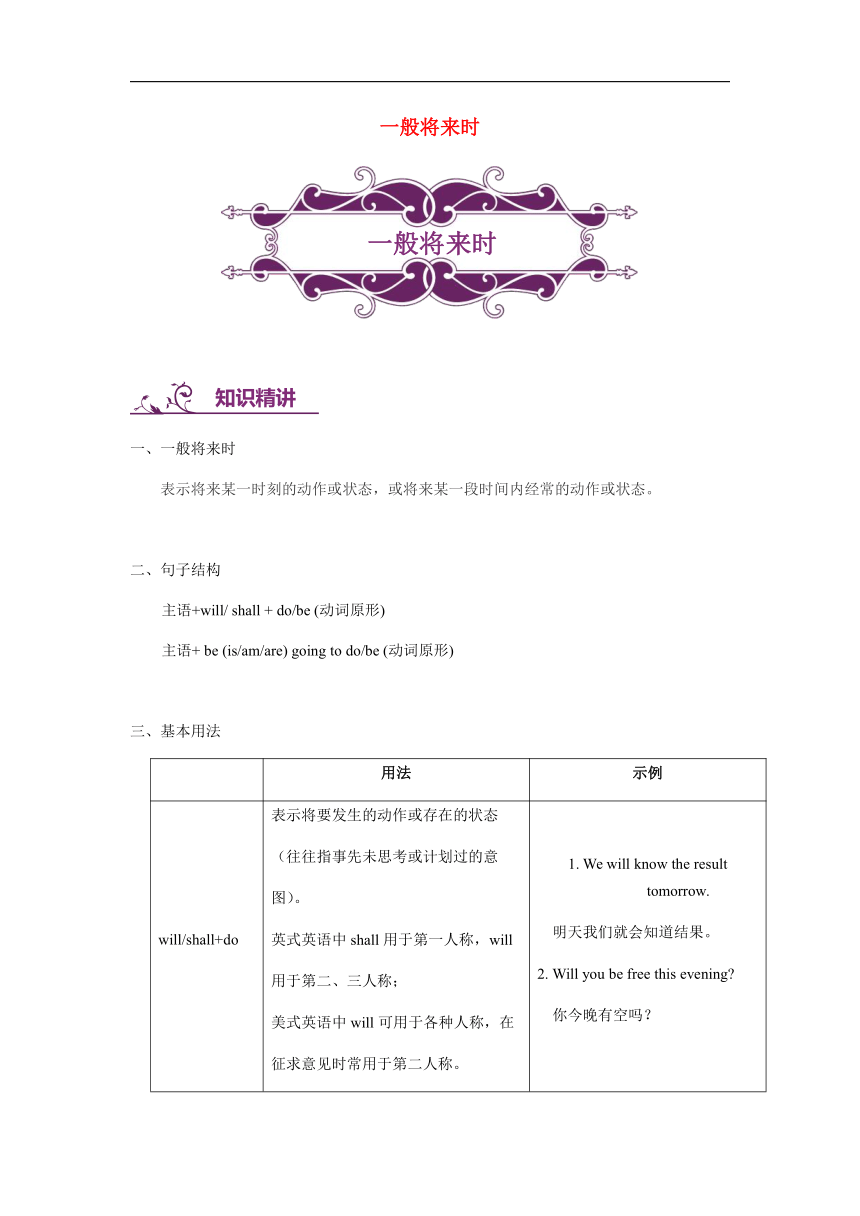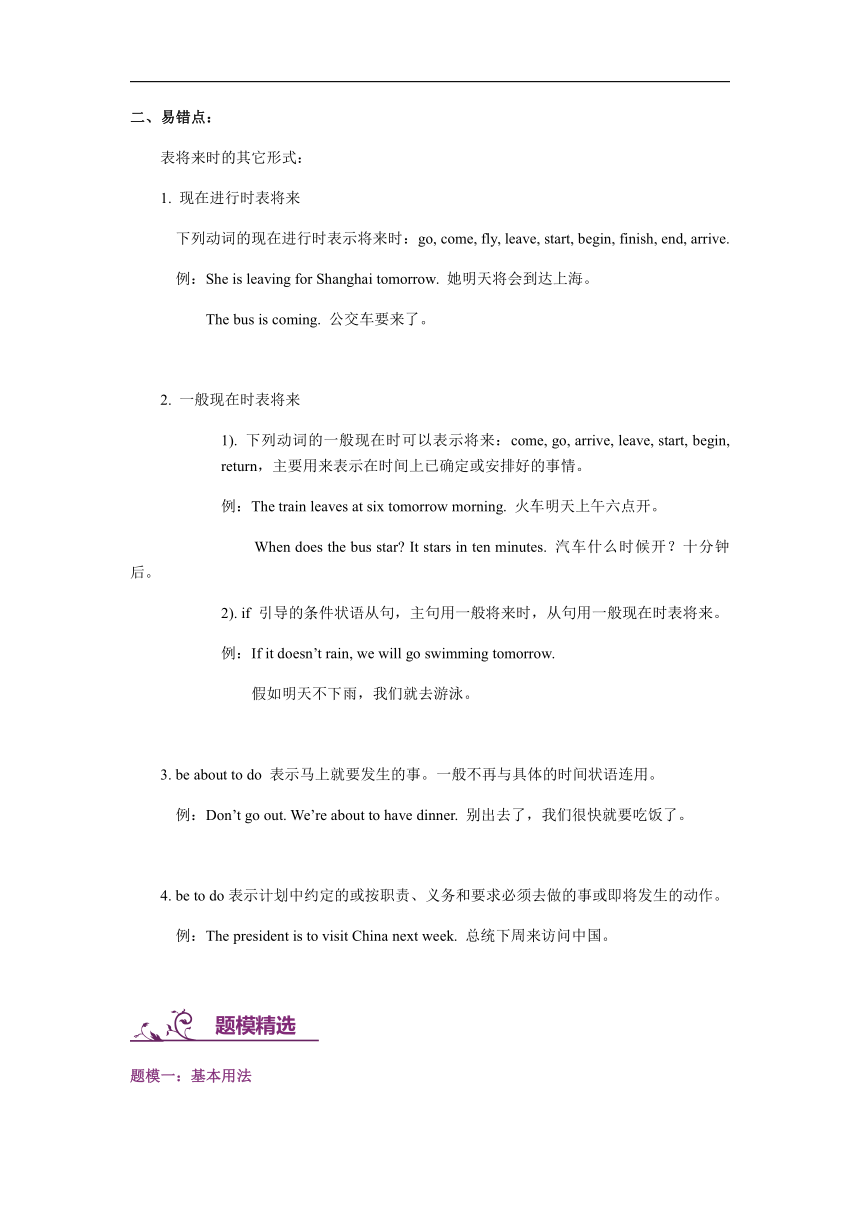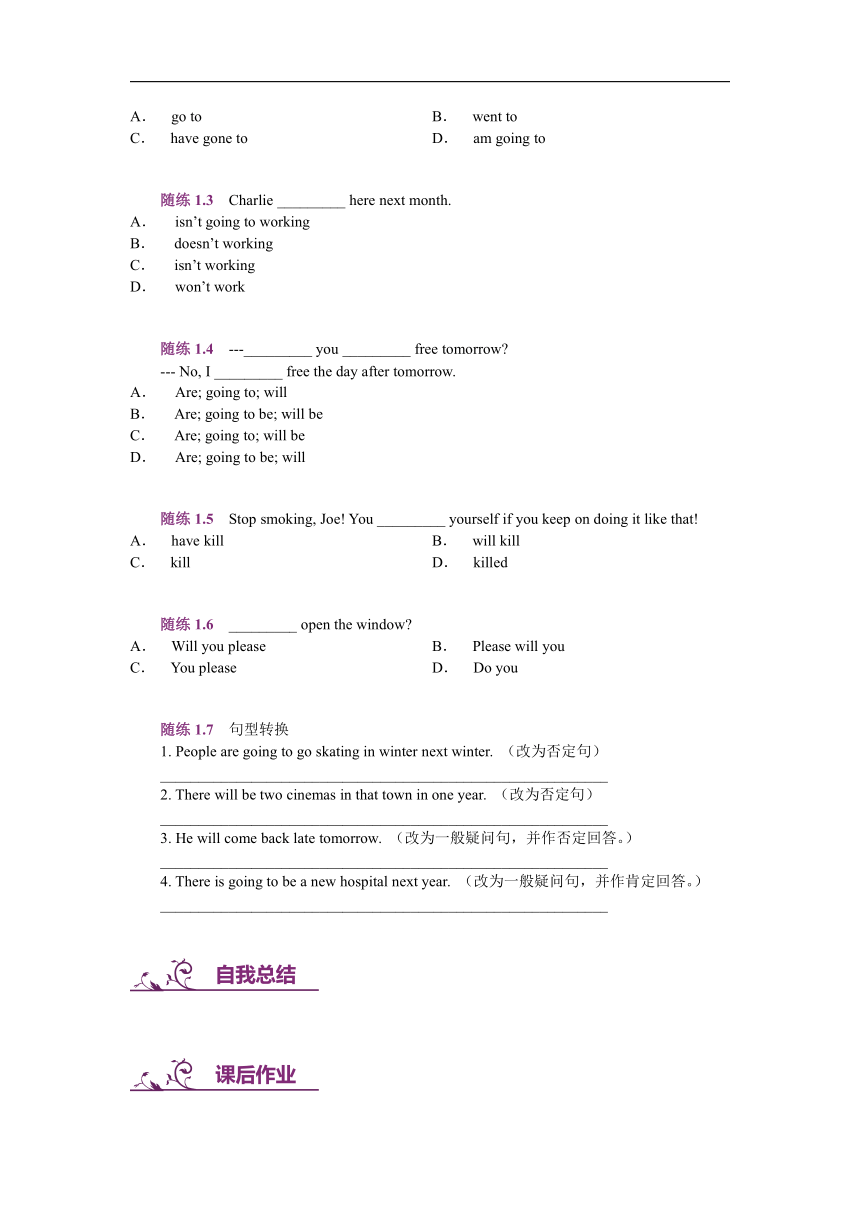中考英语专题讲练: 一般将来时(含解析)
文档属性
| 名称 | 中考英语专题讲练: 一般将来时(含解析) |  | |
| 格式 | zip | ||
| 文件大小 | 139.5KB | ||
| 资源类型 | 教案 | ||
| 版本资源 | 通用版 | ||
| 科目 | 英语 | ||
| 更新时间 | 2020-09-15 06:52:30 | ||
图片预览





文档简介
一般将来时
一、一般将来时
表示将来某一时刻的动作或状态,或将来某一段时间内经常的动作或状态。
二、句子结构
主语+will/
shall
+
do/be
(动词原形)
主语+
be
(is/am/are)
going
to
do/be
(动词原形)
三、基本用法
用法
示例
will/shall+do
表示将要发生的动作或存在的状态(往往指事先未思考或计划过的意图)。英式英语中shall用于第一人称,will用于第二、三人称;美式英语中will可用于各种人称,在征求意见时常用于第二人称。
1.
We
will
know
the
result
tomorrow.明天我们就会知道结果。2.
Will
you
be
free
this
evening?你今晚有空吗?
be
going
to
do
表示计划、打算去做某事(往往指当前计划过或思考过的意图或打算);还可以表示客观迹象表明必将要发生某事。
1.
I’m
going
to
quit
my
present
job.
我打算辞掉现在的工作。2.
Look
at
the
black
clouds
in
the
sky.
It’s
going
to
rain.看天空的黑云。要下雨了。
四、时间状语
1.
tomorrow,
the
day
after
tomorrow
明天,后天
2.
next
week/
month/
year
下周/月/年
3.
in
+时间段(对其提问用how
soon):in
two
days
两天后
4.
in
+过去时间点:in
2020在2020年
5.
soon
不久以后
6.
in
(the)
future
将来、未来
五、相关句式
will
do
be
going
to
do
肯定式
主语+
will
do…
主语+
be
going
to
do…
否定式
主语+
will
+
not
+
do…
主语+
be
+
not
+
going
to
do…
疑问式
Will
+主语+do…?
Be+主语+
going
to
do
…?
一、考点:
一般将来时的基本用法,以及常用的时间状语。注意will
和be
going
to
do
的用法区别。
二、易错点:
表将来时的其它形式:
1.
现在进行时表将来
下列动词的现在进行时表示将来时:go,
come,
fly,
leave,
start,
begin,
finish,
end,
arrive.
例:She
is
leaving
for
Shanghai
tomorrow.
她明天将会到达上海。
The
bus
is
coming.
公交车要来了。
2.
一般现在时表将来
1).
下列动词的一般现在时可以表示将来:come,
go,
arrive,
leave,
start,
begin,
return,主要用来表示在时间上已确定或安排好的事情。
例:The
train
leaves
at
six
tomorrow
morning.
火车明天上午六点开。
When
does
the
bus
star?
It
stars
in
ten
minutes.
汽车什么时候开?十分钟后。
2).
if
引导的条件状语从句,主句用一般将来时,从句用一般现在时表将来。
例:If
it
doesn’t
rain,
we
will
go
swimming
tomorrow.
假如明天不下雨,我们就去游泳。
3.
be
about
to
do
表示马上就要发生的事。一般不再与具体的时间状语连用。
例:Don’t
go
out.
We’re
about
to
have
dinner.
别出去了,我们很快就要吃饭了。
4.
be
to
do表示计划中约定的或按职责、义务和要求必须去做的事或即将发生的动作。
例:The
president
is
to
visit
China
next
week.
总统下周来访问中国。
题模一:基本用法
例1.1.1
He
is
very
busy
this
week,
he
_________
free
next
week.
A.
will
is
B.
is
C.
will
D.
will
be
例1.1.2
_________
your
brother
_________
a
magazine
from
the
library?
A.
Are;
will
borrow
B.
Is;
going
to
borrow
C.
Will;
borrows
D.
Are;
going
to
borrows
例1.1.3
If
they
come,
we
_________
a
meeting.
A.
will
have
B.
have
C.
had
D.
would
have
题模二:句型转换
例1.2.1
I’ll
go
and
join
them.(改为否定句)
____________________________________
例1.2.2
Nancy
is
going
to
go
camping.(改为否定句)
____________________________________
例1.2.3
I’m
going
to
get
up
at
6:30
tomorrow.(变一般疑问句)
____________________________________
例1.2.4
We
will
meet
at
the
bus
stop
at
10:30.(变一般疑问句)
____________________________________
随练1.1
He?_________check
his
email?at
the
weekend.
A.
?will?be
B.
?is
C.
will
D.
?
is
going
随练1.2
I
_________
the
shops.
Can
I
get
you
anything?
A.
go
to
B.
went
to
C.
have
gone
to
D.
am
going
to
随练1.3
Charlie?_________?here?next?month.
A.
?isn’t?going?to
working????
B.
?doesn’t?working
C.
?isn’t?working
D.
?won’t?work
随练1.4
---_________?you?_________?free?tomorrow?
---
No,?I?_________?free?the?day?after?tomorrow.
A.
?Are;?going?to;?will
B.
?Are;?going?to?be;?will?be
C.
?Are;?going?to;?will?be
D.
?Are;?going?to?be;?will
随练1.5
Stop
smoking,
Joe!
You
_________
yourself
if
you
keep
on
doing
it
like
that!
A.
have
kill
B.
will
kill
C.
kill
D.
killed
随练1.6
_________
open
the
window?
A.
Will
you
please
B.
Please
will
you
C.
You
please
D.
Do
you
随练1.7
句型转换
1.
People
are
going
to
go
skating
in
winter
next
winter.
(改为否定句)
___________________________________________________________
2.
There
will
be
two
cinemas
in
that
town
in
one
year.
(改为否定句)
___________________________________________________________
3.
He
will
come
back
late
tomorrow.
(改为一般疑问句,并作否定回答。)
___________________________________________________________
4.
There?is?going?to?be?a?new?hospital?next?year.
(改为一般疑问句,并作肯定回答。)
___________________________________________________________
作业1
He
_________
to
us
as
soon
as
he
gets
there
A.
write
B.
will
write
C.
has
written
D.
wrote
作业2
Attention,
please.
There
__________
a
football
game
between
China
and
Korea
this
evening.
A.
is
going
to
be
B.
has
been
C.
has
D.
will
have
作业3
He
_________
her
a
beautiful
hat
on
her
next
birthday.
A.
gives
B.
gave
C.
will
giving
D.
is
going
to
give
作业4
---
Shall
I
come
again
tomorrow
afternoon?
---_________.
(好的).
A.
Yes,
please
B.
Yes,
you
will
C.
No,
please
D.
No,
you
won’t
作业5
If
there
is
any
change
to
the
plan,
I
_________
you
as
soon
as
possible.
A.
told
B.
have
told
C.
tell
D.
will
tell
作业6
The
train
_________
at
11.
A.
going
to
arrive
B.
will
be
arrive
C.
is
arriving
D.
is
going
to
作业7
句型转换
1.
I’ll?go?and?join?them.
否定句:_________________________________
一般疑问句:_________________________________
2.
She?will?have?an?English?lesson?the?day?after?tomorrow.
否定句:_________________________________
一般疑问句:_________________________________
3.
I?am?going?to
shop
for
cloth?this?afternoon.
否定句:_________________________________
一般疑问句:_________________________________
4.
He?is?going?to?see?his?grandpa?tomorrow.
否定句:_________________________________
一般疑问句:_________________________________
答案解析
题模一:基本用法
例1.1.1
【答案】D
【解析】
考查一般将来时。next
week是一般将来时的时间状语,will
+do/be动词原形。故选D。
例1.1.2
【答案】B
【解析】
考查一般将来时。
your
brother是第三人称单数,is
going
to
do
计划、打算做某事。故选B。
例1.1.3
【答案】A
【解析】
考查一般将来时。主句用一般将来时,从句用一般现在时表将来。故选A。
题模二:句型转换
例1.2.1
【答案】
I
won’t
go
and
join
them.
【解析】
考查一般将来时的句型转换。此句型的否定句:主语+won’t
+
do.
例1.2.2
【答案】
Nancy
isn’t
going
to
go
camping.
【解析】
考查一般将来时的句型转换。此句型的否定句:主语+be
+
not
+
going
to
do.
例1.2.3
【答案】
Are
you
going
to
get
up
at
6:30
tomorrow?
【解析】
考查一般将来时的句型转换。此句型的疑问句:Be+主语+going
to
do?
人称的变化:第一人称变为第二人称。
例1.2.4
【答案】
Will
you
meet
at
the
bus
stop
at
10:30?
【解析】
考查一般将来时的句型转换。此句型的疑问句:Will+主语+do?
人称的变化:第一人称变为第二人称。
随练1.1
【答案】C
【解析】
考查一般将来时。at
the
weekend为一般将来时的时间状语。故选C。
随练1.2
【答案】D
【解析】
考查一般将来时。由句意“我计划要去商店。我能为您带些什么吗?”可知,故选D。
随练1.3
【答案】D
【解析】
考查一般将来时。next?month为一般将来时的时间状语。故选D。
随练1.4
【答案】B
【解析】
考查一般将来时。tomorrow为一般将来时的时间状语,主语是第二人称you,主语be
+going
to
+动词原形,主语+will
+动词原形,故选B。
随练1.5
【答案】B
【解析】
考查一般将来时。You为第二人称,肯定句结构为:主语+will+
do原形。故选B。
随练1.6
【答案】A
【解析】
考查一般将来时。固定句型Will
you
please
do
sth.
?
“请您做…?”,故选A。
随练1.7
【答案】
1.
People
aren’t
going
to
go
skating
in
winter
next
winter.
2.
There
will
not
be
two
cinemas
in
that
town
in
one
year.
3.
Will
he
come
back
late
tomorrow?
No,
he
won’t.
4.
Is
there
going
to
be
a
new
hospital
next
year?
Yes,
there
is.
【解析】
1.
考查一般将来时的句型转换。此句型的否定句:主语+be
+not
going
to
do.
2.
考查一般将来时的句型转换。此句型的否定句:There
will
be
….
3.
考查一般将来时的句型转换。此句型的疑问句:Will+主语+do?
4.
考查一般将来时的句型转换。此句型的疑问句:Be+
there
+going
to
do?
作业1
【答案】B
【解析】
考查一般将来时。as
soon
as
引导的是从句用一般现在时,主句用一般将来时。故选B。
作业2
【答案】A
【解析】
考查一般将来时。this
evening为一般将来时的时间状语。There
be句型的将来时句型为There
will
be…。故选A。
作业3
【答案】D
【解析】
考查一般将来时。next
birthday下一个生日,此为一般将来时的时间状语,再由句意可知,故选D。
作业4
【答案】A
【解析】
考查一般将来时。回答词问句的答语有Yes,
please(好的,谢谢)或者No,
thanks.(不,谢谢)这两种说法。故选A。
作业5
【答案】D
【解析】
考查一般将来时。主句用一般将来时,从句用一般现在时表将来。再由句意可知,故选D。
作业6
【答案】C
【解析】
考查一般将来时。现在进行时表将来,再由句意“火车即将在11点到达。”可知,故选C。
作业7
【答案】
1.
I
won’t
go?and?join?them.
Will
you
go
and
join
them?
2.
She?won’t
have?an?English?lesson?the?day?after?tomorrow.
Will
she
have?an?English?lesson?the?day?after?tomorrow?
3.
I’m
not?going?to
shop?for
cloth
this?afternoon.
Are
you
going
to
shop
for
cloth
this
afternoon?
4.
He?isn’t?going?to?see?his?grandpa?tomorrow.
Is
he
going?to?see?his?grandpa?tomorrow?
【解析】
1.
考查一般将来时的句型转换。此句型的否定句:主语+won’t
+do;疑问句型:Will+主语+do?
2.
考查一般将来时的句型转换。此句型的否定句:主语+won’t
+do;疑问句型:Will+主语+do?
3.
考查一般将来时的句型转换。此句型的否定句:主语+be
+not
+
going
to
do;疑问句:Be+主语+going
to
do?
人称变化:第一人称变为第二人称。
4.
考查一般将来时的句型转换。此句型的否定句:主语+be
+not
+
going
to
do;疑问句:Be+主语+going
to
do?
一般将来时
知识精讲
三点剖析
题模精选
随堂练习
自我总结
课后作业
一般将来时
题模精选
随堂练习
PAGE
一、一般将来时
表示将来某一时刻的动作或状态,或将来某一段时间内经常的动作或状态。
二、句子结构
主语+will/
shall
+
do/be
(动词原形)
主语+
be
(is/am/are)
going
to
do/be
(动词原形)
三、基本用法
用法
示例
will/shall+do
表示将要发生的动作或存在的状态(往往指事先未思考或计划过的意图)。英式英语中shall用于第一人称,will用于第二、三人称;美式英语中will可用于各种人称,在征求意见时常用于第二人称。
1.
We
will
know
the
result
tomorrow.明天我们就会知道结果。2.
Will
you
be
free
this
evening?你今晚有空吗?
be
going
to
do
表示计划、打算去做某事(往往指当前计划过或思考过的意图或打算);还可以表示客观迹象表明必将要发生某事。
1.
I’m
going
to
quit
my
present
job.
我打算辞掉现在的工作。2.
Look
at
the
black
clouds
in
the
sky.
It’s
going
to
rain.看天空的黑云。要下雨了。
四、时间状语
1.
tomorrow,
the
day
after
tomorrow
明天,后天
2.
next
week/
month/
year
下周/月/年
3.
in
+时间段(对其提问用how
soon):in
two
days
两天后
4.
in
+过去时间点:in
2020在2020年
5.
soon
不久以后
6.
in
(the)
future
将来、未来
五、相关句式
will
do
be
going
to
do
肯定式
主语+
will
do…
主语+
be
going
to
do…
否定式
主语+
will
+
not
+
do…
主语+
be
+
not
+
going
to
do…
疑问式
Will
+主语+do…?
Be+主语+
going
to
do
…?
一、考点:
一般将来时的基本用法,以及常用的时间状语。注意will
和be
going
to
do
的用法区别。
二、易错点:
表将来时的其它形式:
1.
现在进行时表将来
下列动词的现在进行时表示将来时:go,
come,
fly,
leave,
start,
begin,
finish,
end,
arrive.
例:She
is
leaving
for
Shanghai
tomorrow.
她明天将会到达上海。
The
bus
is
coming.
公交车要来了。
2.
一般现在时表将来
1).
下列动词的一般现在时可以表示将来:come,
go,
arrive,
leave,
start,
begin,
return,主要用来表示在时间上已确定或安排好的事情。
例:The
train
leaves
at
six
tomorrow
morning.
火车明天上午六点开。
When
does
the
bus
star?
It
stars
in
ten
minutes.
汽车什么时候开?十分钟后。
2).
if
引导的条件状语从句,主句用一般将来时,从句用一般现在时表将来。
例:If
it
doesn’t
rain,
we
will
go
swimming
tomorrow.
假如明天不下雨,我们就去游泳。
3.
be
about
to
do
表示马上就要发生的事。一般不再与具体的时间状语连用。
例:Don’t
go
out.
We’re
about
to
have
dinner.
别出去了,我们很快就要吃饭了。
4.
be
to
do表示计划中约定的或按职责、义务和要求必须去做的事或即将发生的动作。
例:The
president
is
to
visit
China
next
week.
总统下周来访问中国。
题模一:基本用法
例1.1.1
He
is
very
busy
this
week,
he
_________
free
next
week.
A.
will
is
B.
is
C.
will
D.
will
be
例1.1.2
_________
your
brother
_________
a
magazine
from
the
library?
A.
Are;
will
borrow
B.
Is;
going
to
borrow
C.
Will;
borrows
D.
Are;
going
to
borrows
例1.1.3
If
they
come,
we
_________
a
meeting.
A.
will
have
B.
have
C.
had
D.
would
have
题模二:句型转换
例1.2.1
I’ll
go
and
join
them.(改为否定句)
____________________________________
例1.2.2
Nancy
is
going
to
go
camping.(改为否定句)
____________________________________
例1.2.3
I’m
going
to
get
up
at
6:30
tomorrow.(变一般疑问句)
____________________________________
例1.2.4
We
will
meet
at
the
bus
stop
at
10:30.(变一般疑问句)
____________________________________
随练1.1
He?_________check
his
email?at
the
weekend.
A.
?will?be
B.
?is
C.
will
D.
?
is
going
随练1.2
I
_________
the
shops.
Can
I
get
you
anything?
A.
go
to
B.
went
to
C.
have
gone
to
D.
am
going
to
随练1.3
Charlie?_________?here?next?month.
A.
?isn’t?going?to
working????
B.
?doesn’t?working
C.
?isn’t?working
D.
?won’t?work
随练1.4
---_________?you?_________?free?tomorrow?
---
No,?I?_________?free?the?day?after?tomorrow.
A.
?Are;?going?to;?will
B.
?Are;?going?to?be;?will?be
C.
?Are;?going?to;?will?be
D.
?Are;?going?to?be;?will
随练1.5
Stop
smoking,
Joe!
You
_________
yourself
if
you
keep
on
doing
it
like
that!
A.
have
kill
B.
will
kill
C.
kill
D.
killed
随练1.6
_________
open
the
window?
A.
Will
you
please
B.
Please
will
you
C.
You
please
D.
Do
you
随练1.7
句型转换
1.
People
are
going
to
go
skating
in
winter
next
winter.
(改为否定句)
___________________________________________________________
2.
There
will
be
two
cinemas
in
that
town
in
one
year.
(改为否定句)
___________________________________________________________
3.
He
will
come
back
late
tomorrow.
(改为一般疑问句,并作否定回答。)
___________________________________________________________
4.
There?is?going?to?be?a?new?hospital?next?year.
(改为一般疑问句,并作肯定回答。)
___________________________________________________________
作业1
He
_________
to
us
as
soon
as
he
gets
there
A.
write
B.
will
write
C.
has
written
D.
wrote
作业2
Attention,
please.
There
__________
a
football
game
between
China
and
Korea
this
evening.
A.
is
going
to
be
B.
has
been
C.
has
D.
will
have
作业3
He
_________
her
a
beautiful
hat
on
her
next
birthday.
A.
gives
B.
gave
C.
will
giving
D.
is
going
to
give
作业4
---
Shall
I
come
again
tomorrow
afternoon?
---_________.
(好的).
A.
Yes,
please
B.
Yes,
you
will
C.
No,
please
D.
No,
you
won’t
作业5
If
there
is
any
change
to
the
plan,
I
_________
you
as
soon
as
possible.
A.
told
B.
have
told
C.
tell
D.
will
tell
作业6
The
train
_________
at
11.
A.
going
to
arrive
B.
will
be
arrive
C.
is
arriving
D.
is
going
to
作业7
句型转换
1.
I’ll?go?and?join?them.
否定句:_________________________________
一般疑问句:_________________________________
2.
She?will?have?an?English?lesson?the?day?after?tomorrow.
否定句:_________________________________
一般疑问句:_________________________________
3.
I?am?going?to
shop
for
cloth?this?afternoon.
否定句:_________________________________
一般疑问句:_________________________________
4.
He?is?going?to?see?his?grandpa?tomorrow.
否定句:_________________________________
一般疑问句:_________________________________
答案解析
题模一:基本用法
例1.1.1
【答案】D
【解析】
考查一般将来时。next
week是一般将来时的时间状语,will
+do/be动词原形。故选D。
例1.1.2
【答案】B
【解析】
考查一般将来时。
your
brother是第三人称单数,is
going
to
do
计划、打算做某事。故选B。
例1.1.3
【答案】A
【解析】
考查一般将来时。主句用一般将来时,从句用一般现在时表将来。故选A。
题模二:句型转换
例1.2.1
【答案】
I
won’t
go
and
join
them.
【解析】
考查一般将来时的句型转换。此句型的否定句:主语+won’t
+
do.
例1.2.2
【答案】
Nancy
isn’t
going
to
go
camping.
【解析】
考查一般将来时的句型转换。此句型的否定句:主语+be
+
not
+
going
to
do.
例1.2.3
【答案】
Are
you
going
to
get
up
at
6:30
tomorrow?
【解析】
考查一般将来时的句型转换。此句型的疑问句:Be+主语+going
to
do?
人称的变化:第一人称变为第二人称。
例1.2.4
【答案】
Will
you
meet
at
the
bus
stop
at
10:30?
【解析】
考查一般将来时的句型转换。此句型的疑问句:Will+主语+do?
人称的变化:第一人称变为第二人称。
随练1.1
【答案】C
【解析】
考查一般将来时。at
the
weekend为一般将来时的时间状语。故选C。
随练1.2
【答案】D
【解析】
考查一般将来时。由句意“我计划要去商店。我能为您带些什么吗?”可知,故选D。
随练1.3
【答案】D
【解析】
考查一般将来时。next?month为一般将来时的时间状语。故选D。
随练1.4
【答案】B
【解析】
考查一般将来时。tomorrow为一般将来时的时间状语,主语是第二人称you,主语be
+going
to
+动词原形,主语+will
+动词原形,故选B。
随练1.5
【答案】B
【解析】
考查一般将来时。You为第二人称,肯定句结构为:主语+will+
do原形。故选B。
随练1.6
【答案】A
【解析】
考查一般将来时。固定句型Will
you
please
do
sth.
?
“请您做…?”,故选A。
随练1.7
【答案】
1.
People
aren’t
going
to
go
skating
in
winter
next
winter.
2.
There
will
not
be
two
cinemas
in
that
town
in
one
year.
3.
Will
he
come
back
late
tomorrow?
No,
he
won’t.
4.
Is
there
going
to
be
a
new
hospital
next
year?
Yes,
there
is.
【解析】
1.
考查一般将来时的句型转换。此句型的否定句:主语+be
+not
going
to
do.
2.
考查一般将来时的句型转换。此句型的否定句:There
will
be
….
3.
考查一般将来时的句型转换。此句型的疑问句:Will+主语+do?
4.
考查一般将来时的句型转换。此句型的疑问句:Be+
there
+going
to
do?
作业1
【答案】B
【解析】
考查一般将来时。as
soon
as
引导的是从句用一般现在时,主句用一般将来时。故选B。
作业2
【答案】A
【解析】
考查一般将来时。this
evening为一般将来时的时间状语。There
be句型的将来时句型为There
will
be…。故选A。
作业3
【答案】D
【解析】
考查一般将来时。next
birthday下一个生日,此为一般将来时的时间状语,再由句意可知,故选D。
作业4
【答案】A
【解析】
考查一般将来时。回答词问句的答语有Yes,
please(好的,谢谢)或者No,
thanks.(不,谢谢)这两种说法。故选A。
作业5
【答案】D
【解析】
考查一般将来时。主句用一般将来时,从句用一般现在时表将来。再由句意可知,故选D。
作业6
【答案】C
【解析】
考查一般将来时。现在进行时表将来,再由句意“火车即将在11点到达。”可知,故选C。
作业7
【答案】
1.
I
won’t
go?and?join?them.
Will
you
go
and
join
them?
2.
She?won’t
have?an?English?lesson?the?day?after?tomorrow.
Will
she
have?an?English?lesson?the?day?after?tomorrow?
3.
I’m
not?going?to
shop?for
cloth
this?afternoon.
Are
you
going
to
shop
for
cloth
this
afternoon?
4.
He?isn’t?going?to?see?his?grandpa?tomorrow.
Is
he
going?to?see?his?grandpa?tomorrow?
【解析】
1.
考查一般将来时的句型转换。此句型的否定句:主语+won’t
+do;疑问句型:Will+主语+do?
2.
考查一般将来时的句型转换。此句型的否定句:主语+won’t
+do;疑问句型:Will+主语+do?
3.
考查一般将来时的句型转换。此句型的否定句:主语+be
+not
+
going
to
do;疑问句:Be+主语+going
to
do?
人称变化:第一人称变为第二人称。
4.
考查一般将来时的句型转换。此句型的否定句:主语+be
+not
+
going
to
do;疑问句:Be+主语+going
to
do?
一般将来时
知识精讲
三点剖析
题模精选
随堂练习
自我总结
课后作业
一般将来时
题模精选
随堂练习
PAGE
同课章节目录
- 词法
- 名词
- 动词和动词短语
- 动词语态
- 动词时态
- 助动词和情态动词
- 非谓语动词
- 冠词
- 代词
- 数词和量词
- 形容词副词及其比较等级
- 介词和介词短语
- 连词和感叹词
- 构词法
- 相似、相近词比较
- 句法
- 陈述句
- 一般疑问句和否定疑问句
- 特殊疑问句及选择疑问句
- 反意疑问句
- 存在句(There be句型)
- 宾语从句
- 定语从句
- 状语从句
- 主谓一致问题
- 简单句
- 并列句
- 复合句
- 主谓一致
- 主、表语从句
- 名词性从句
- 直接引语和间接引语
- 虚拟语气
- 感叹句
- 强调句
- 倒装句
- 祈使句
- 句子的成分
- 句子的分类
- 题型专区
- 单项选择部分
- 易错题
- 完形填空
- 阅读理解
- 词汇练习
- 听说训练
- 句型转换
- 补全对话
- 短文改错
- 翻译
- 书面表达
- 任务型阅读
- 语法填空
- 其他资料
